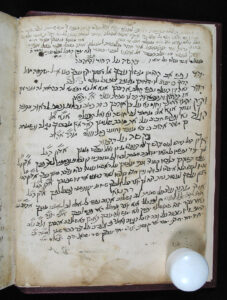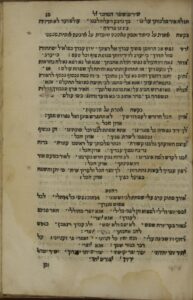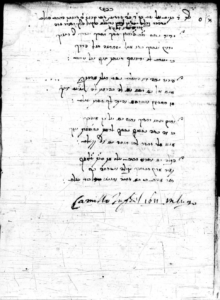| Source (Hebrew) | Translation (English) |
|---|---|
יְדִיד נֶפֶשׁ אָב הָרַחֲמָן, מְשֹׁךְ עַבְדָּךְ אֶל רְצוֹנָךְ, יָרוּץ עַבְדָּךְ כְּמוֹ אַיָּל, יִשְׁתַּחֲוֶה מוּל הֲדָרָךְ, כִּי יֶעֱרַב לוֹ יְדִידוּתָךְ, מִנֹּפֶת צוּף וְכָל טַעַם. |
O most dearly beloved! O merciful father! Draw me, your slave, toward your will; your slave will run like a gazelle to prostrate himself before your splendor. Your companionship will be as pleasing to him as honey and nectar and every good savor. |
הָדוּר נָאֶה זִיו הָעוֹלָם, נַפְשִׁי חוֹלַת אַהֲבָתָךְ, אָנָּא אֵל נָא רְפָא נָא לָהּ, בְּהַרְאוֹת לָהּ נֹעַם זִיוָךְ, אָז תִּתְחַזֵּק וְתִתְרַפֵּא, וְהָיְתָה לָךְ שִׁפְחַת עוֹלָם. |
O most splendid! O light of the world! My soul is ill from love of you. Please, my El, please heal her[1] cf. Numbers 12:13. by showing her the beauty of your light. Then she will be strengthened, and she will be healed, and she will have eternal joy. |
וָתִיק יֶהֱמוּ רַחֲמֶיךָ, וְחוּסָה נָא עַל בֶּן אוֹהֲבָךְ, כִּי זֶה כַמָּה נִכְסֹף נִכְסַף, לִרְאוֹת בְּתִפְאֶרֶת עֻזָּךְ, אָנָּא, אֵלִי, מַחֲמַד לִבִּי, חוּשָׁה נָא וְאַל תִּתְעַלָּם. |
O most faithful! Arouse your mercy! Have pity on your beloved child, for how much how much! have I longed to gaze upon your mighty splendor. This is my heart’s desire: have pity and do not disregard me. |
הִגָּלֶה נָא וּפְרֹשׂ, חָבִיב, עָלַי אֶת סֻכַּת שְׁלוֹמָךְ תָּאִיר אֶרֶץ מִכְּבוֹדָךְ, נָגִילָה וְנִשְׂמְחָה בָּךְ, מַהֵר, אָהוּב, כִּי בָא מוֹעֵד, וְחָנֵּנִי כִּימֵי עוֹלָם. |
Be revealed, my beloved, and spread the canopy of your peace over me. Illumine the earth with your glory; we will rejoice and be glad in you. Hurry, beloved, for the time has come. Be gracious to us for eternity. |
“Yedid Nefesh” is a piyyut first published in the Sefer Haḥaredim (1588) of Rabbi Elazar Moshe Azikri (1533-1600). The authorship of the piyyut is not completely certain. A version of the piyyut “with noteworthy text, spelling and pointing” may be found on folio 146 (verso) of Samuel b. David b. Solomon’s Commentary On the Book of Numbers (ca. 1437 CE).[2] Find Stefan C. Reif’s The Hebrew Manuscripts at Cambridge University Libraries: A Description and Introduction Cambridge: Cambridge University Press, 1997, page 93. Reif attributes Yedid Nefesh to Azkiri. Presumably, the text must have been added to the 15th century manuscript sometime after the publication of Sefer Haḥaredim. It would be very nice to see a digitized image of this manuscript page from the CUL collection! Yedid Nefesh also appears in Moscow – Russian State Library, Ms. Guenzburg 320 as the last of “a polyglot of at least 24 different items written in different stages” (find Dr. Ezra Chwat, גילוי מילתא בעלמא Giluy Milta B’alma). Yedid Nefesh appears there under the following headline: ד’ בתים של שם בן ד’ ב”ה ששמענו מפי קדוש מכבוד החכם השלם מהר”ר גדליה בן לגאון המושלם המקובל [הא]לקי כמהר”ר משה קורדוברו זצק”ל”. Ezra Chwat: “This doesn’t necessarily qualify that Gedalia Cordovero (1562–1625, son of Moshe Cordovero, ReMaK), is the author. To be precise, it attributes to him the oral transmission.” Meir Benayahu in Yosef Behiri, 1991, p.544, “asserts that this witness must have heard the poem from Gedalia Cordevero after his descent [from Safed] to Italy in 1583. This would be a full five years before Ḥaredim was written (and 17 years before [it was] published). Having been transmitted orally for some time might explain some of the variants. In any case Gedalia Cordevero and Elazar Azkari are likely to have been well acquainted.” The piyyut has appeared with a number of variations in various siddurim.
The variation and translation of Yedid Nefesh here can be found in HaAvodah SheBaLev – the Service of the Heart (Kehilat Kol HaNeshama, Jerusalem, 2007). “Adonai” is used as a circumlocution for the Tetragrammaton in the English translation. I have replaced God with ‘El.’ –Aharon Varady.
Source(s)

Yedid Nefesh (JTSA MS3541, fol.5v) yedid nefesh – sefer haḥaredim 43a (Venice 1597)

Notes
| 1 | cf. Numbers 12:13. |
|---|---|
| 2 | Find Stefan C. Reif’s The Hebrew Manuscripts at Cambridge University Libraries: A Description and Introduction Cambridge: Cambridge University Press, 1997, page 93. Reif attributes Yedid Nefesh to Azkiri. Presumably, the text must have been added to the 15th century manuscript sometime after the publication of Sefer Haḥaredim. It would be very nice to see a digitized image of this manuscript page from the CUL collection! |

“יְדִיד נֶפֶשׁ | Yedid Nefesh, a piyyut transmitted by Elazar ben Moshe Azikri (ca. 16th c.) translation by Rabbi Levi Weiman-Kelman & Shaul Vardi” is shared through the Open Siddur Project with a Creative Commons Attribution-ShareAlike 4.0 International copyleft license.











Leave a Reply